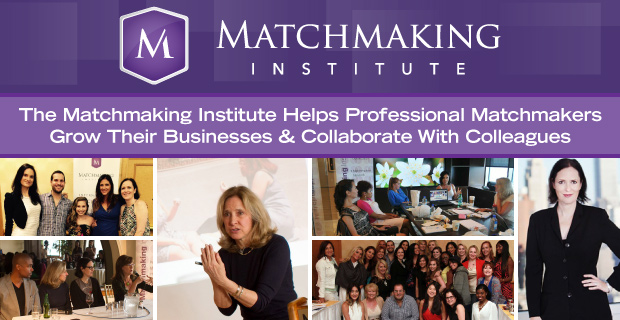FOR more than three years, Jennifer Silver, 33, a freelance marketing consultant in Manhattan, trolled online dating sites looking for love. She tried Match.com and JDate.
“I had the worst experiences,” Ms. Silver said. When one potential date didn’t bear the slightest resemblance to his photo, she walked right past him, thinking he had stood her up. “People were very dishonest,” Ms. Silver said. She hired a traditional matchmaker instead.
One might think that in an age of unparalleled access to potential dates through the Internet, matchmakers would be scraping for business. Instead, their business is on an upswing, according to John LaRosa, the author of a report by the Marketdata Enterprises, a research firm. Matchmakers now number more than 1,600 in the United States, up from 1,300 in 2004. He also notes that “matchmaking overall has lost its social stigma for many people.”
Some of the success of these headhunters for the heart can be attributed to a reaction to the well-publicized
pitfalls of online dating. Matchmakers have also helped themselves by adapting some of the same technologies that their online competitors use.
“People are getting a bit burnt out” by the lack of privacy and abundance of misinformation found on dating sites, said Lisa Clampitt, the executive director of the Matchmaking Institute, a school in Manhattan.
“You could be successful online, but it’s random,” Ms. Clampitt said, describing situations in which daters send e-mail messages to 20 potential mates at a time or profess to be 5-foot-7 when 5-foot-2 is more like it.
Matchmakers prescreen potential matches, focusing on long-term compatibility rather than “short-term chemistry,” Ms. Clampitt said.
While online sites allow unlimited fantasizing, matchmakers encourage clients to take their heads out of the clouds. “Sometimes we will get a guy who is a good-looking man, but no Brad Pitt, and he wants a thin model,” said Shoshanna Rikon, the owner of Shoshanna’s Matches, a Yenta-style matchmaking service in Manhattan that includes an in-person interview and a Web presence, and charges about $1,500 for eight dates. “We try to be more realistic with who we set him up with.”
Another sign of the rise of the go-between: 80 matchmakers gathered on Friday in Weehawken, N.J., for a two-day conference that the Matchmaking Institute, which organized it, bills as the first of its kind here. Its keynote speaker, Mark Brooks of Online Personals Watch, told participants that matchmakers offer “a chance to connect” and “a chance to authenticate” prospects in ways the Web sites can’t. He pointed out that the problem for matchmakers has always been casting a wide enough net; for online sites the problem has been narrowing the pool. He advised both to find common ground.
Among the other presenters was Julie Ferman, who owns Cupid’s Coach in Los Angeles. In an interview before the conference she said that when Internet dating took off a decade ago, it seemed like “personal matchmaking would be a dinosaur.” Instead, she said, the “big chasm” between their businesses has narrowed as matchmakers have begun using a more hybrid approach.
Cupid’s Coach teams up with Internet dating sites to give parties. When the singles show up, Ms. Ferman meets them, takes their photographs, gets their contact information and adds them to her database of 12,000 names. Clients typically sign up through her Web site or send her an e-mail message; she follows up with an interview.
“I will only refer them once I have met them personally,” Ms. Ferman said.
A 2006 survey undertaken by the Pew Internet and American Life Project found that while 52 percent of the 16 million people who have used online dating sites had mostly positive experiences, 29 percent report mostly negative experiences. Most said that “many online daters lie about their marital status,” the report said. And according to a 2007 report by JupiterResearch, the percentage of people browsing those sites is stagnating.
Major online sites like Match.com are catching on to singles’ concerns. Last December, it rolled out Match Platinum, a matchmaking service, in Dallas, its first test market. Match Platinum promises confidentiality. Its matchmakers interview subscribers over the phone and handpick dates for them. Feedback afterward helps home in on what the client did and didn’t like. The premium service costs $2,000 for six dates versus $34.99 for a month of do-it-yourself browsing online.
Other hybrids combine online technology with tradition. At JRetromatch.com and Sawyouatsinai.com, Jewish dating sites, singles select a matchmaker, who then combs through the lonely hearts database for clients. JRetro’s fees start at $12.95 a month and Sawyouatsinai’s at $9.95.
Elove.com, one of the larger New York-area hybrid offerings, is an Internet service that gives each participant a 90-minute in-person interview, and then follows up with criminal background and marital status checks. Once approved, photographs and videos are taken and posted by the matchmaking service. Subscribers are then given a password to search elove’s database.
Matchmaking “is more about the quality of the individual than the amount of people that you date,” said Gary Ferone, the owner of Great Date Now, a traditional service with eight locations in New York, New Jersey and Connecticut. Mr. Ferone said that 80 percent of his 400 clients had “tried one form of Internet dating or another.” He, in fact, met his own wife six years ago on Match.com, but started his business because he was put off by the laborious process of sifting through hundreds of online prospects.
Even so, Great Date Now embraces technology, using search engines to help drive singles to its Web site, where they fill out questionnaires. Those questionnaires are reviewed by matchmakers, who then contact the potential client. Mr. Ferone, whose firm, he says, has facilitated more than 100 marriages, charges those clients $2,500 for unlimited introductions.
April Hunt, 49, a divorced teacher from Milford, Conn., said she turned to Great Date after she had unsuccessfully sought a mate on eharmony.com. Matchmakers, she said, “get a feeling for your chemistry and I don’t think that comes across online.” She found the service’s policy of doing background checks reassuring. “They were protecting me and my children from people who might say they were not married but they were, or maybe were not reputable,” she said.
Last February she met Tom Morgan, 63, a divorced home inspector from Mystic, Conn. Today, they are considering moving in together.
Pleased with his experience, Mr. Morgan added that he felt that the hefty fees charged by services like Great Date equaled more serious seekers.
“With online dating you are one of a million,” said Ms. Silver of Manhattan. So last spring she opted to hire Ms. Rikon. “Why not turn to someone who will be looking out for your best interests?” Ms. Silver said. She says she struck gold on her third fix-up. Since June she has been dating “a professional in his 30’s,” she said.
Monika Galius, 37, an industrial engineer from Pasadena, Calif., turned to Cupid’s Coach after being disillusioned when the umpteenth potential online date fizzled. On her eighth prescreened match she met Mark Auburn, a 42-year-old computer consultant from Manhattan Beach, Calif.
“Accountability by far is what helps,” Ms. Galius said.
She and Mr. Auburn are to be married on Nov. 18.
By MARCELLE S. FISCHLER
Published: September 30, 2007



